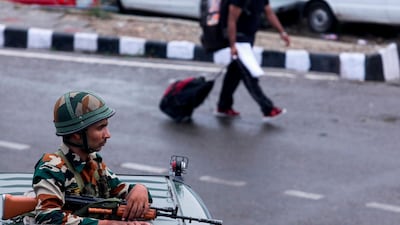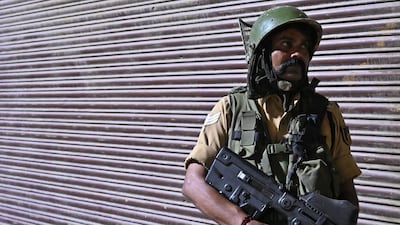On a day of roiling drama, Prime Minister Narendra Modi’s government ended a special constitutional status accorded to Jammu & Kashmir – a controversial move, pushed through with little political consultation, that will transform the troubled state’s relationship to New Delhi.
Mr Modi’s home minister, Amit Shah, also introduced a bill to divide Jammu & Kashmir into two union territories – administrative units overseen closely by the federal government, without most of the legislative and executive freedoms that the state’s government enjoys today. The bill will be voted upon on Tuesday.
The move may be Mr Modi’s most polarising yet.
On the one hand, supporters of the prime minister's Bharatiya Janata Party (BJP) and its Hindu nationalist allies celebrated the announcement. The BJP has long resented Article 370, the constitutional feature stipulating that laws passed by India’s parliament will not apply to Jammu & Kashmir unless the state’s government agrees. This special status was incorporated as a condition for Jammu & Kashmir’s accession to the Indian union in 1947.
Another article, 35A, which provides special privileges such as land ownership rights only to “permanent residents” of the state, was also repealed on Monday. This will allow Hindu migrants to buy land and settle in the Muslim-majority state, something they could not do earlier.
The BJP’s election manifestos have always included the revocation of these articles, arguing that they give the state too many privileges.
Mr Shah argued that revoking Article 370 would be good for Jammu & Kashmir, holding it responsible for poverty, a lack of industry and stagnant land prices. The state never agreed to implement the federal government’s Right to Education Act, which guarantees education to every child aged six to 14. “Why should [Kashmir] valley children not get the benefit of education?” Mr Shah said.
But critics lashed out at the sudden way in which Mr Modi’s government pushed through these measures, riding roughshod over the norms of parliamentary democracy.
Preparations for Monday’s announcements began on Friday, when the government issued alerts to all tourists, including those on a Hindu pilgrimage to the shrine of Amarnath, to leave the state. At least 38,000 additional troops were sent into Jammu & Kashmir, to add to the half-million soldiers already posted there.
On Sunday, all communication services were suspended across the state, sending it into an information blackout. Simultaneously, the leaders of the two biggest regional parties, Mehbooba Mufti and Omar Abdullah, were placed under house arrest.
Jammu & Kashmir has not had an elected government since June last year, when Ms Mufti’s coalition government lost the support of some of its partners. The state was placed under president’s rule – run by the governor, an appointee of Mr Modi’s federal government.
As a result, the revocation of Article 370 was carried out through legal sleight of hand.
The article permits India’s president to suspend its application to Jammu & Kashmir, but only with the agreement of the state government. President Ram Nath Kovind duly signed such an order, upon the request of Mr Modi and Mr Shah. However, since the state is under the supervision of the federally appointed governor, Mr Kovind was essentially seeking Mr Modi’s own agreement to suspend Article 370.
The revocation of Article 370 and Article 35A did not need parliament to pass any bills, but opposition parties protested that they were not consulted or notified of such a momentous change, or allowed to debate it.
“Momentarily you may think you have scored a victory, but you are wrong and history will prove you to be wrong,” P Chidambaram, a senior leader of the opposition Congress party, said. “Future generations will realise what a grave mistake this house is making today.”
Ms Mufti said on Twitter that the government’s move “reduces India to an occupation force in Jammu & Kashmir”.
The bill to split the state into two union territories – one comprising Jammu and the Kashmir valley and the other the high, dry plateau of Ladakh – will likely be passed on Tuesday. The BJP enjoys a large majority in the Lok Sabha, parliament’s lower house, and it has engineered support from smaller parties in the Rajya Sabha, the upper house.
The government’s decision raises fears that the Kashmir valley, beset for decades both by Pakistan-sponsored terrorist groups and by citizen-led protests, will plunge into a fresh cycle of violence.
Australia, Israel, the United Kingdom, and Germany have all issued travel advisories to tourists, asking them to stay away from Kashmir. Petrol stations ran to empty over the weekend as motorists stockpiled fuel, anticipating some kind of uncertainty to visit the valley. The army and the air force were placed on high alert as well.
Across the border, Pakistan – which also claims the Kashmir valley but holds only a part of it –condemned and rejected India’s move. “As the party to this international dispute, Pakistan will exercise all possible options to counter the illegal steps,” a statement from Pakistan’s foreign office said.










